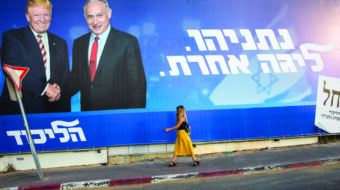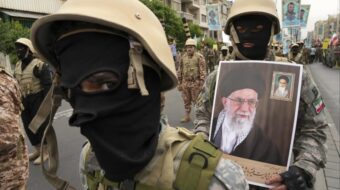
On a recent 11-day tour covering eight European, Asian and African nations, Venezuelan President Hugo Chavez and his entourage went non-stop from factory to farm, energy facilities to governmental chambers. He signed 69 agreements covering energy, agriculture, education, technological interchange, trade, and housing.
Along the way, Chavez extolled revolutionary Venezuela’s role in seeking to build a multi-polar world. “We want relations with the whole world,” he told reporters, insisting that Venezuela’s own foreign policy, not Washington’s, guides his country’s relations with other nations. The Venezuelan president emphasized the necessity of shedding “the perverse model of petroleum mono-production” in favor of export diversity and serving people’s needs, especially housing.
Chavez said, “We are now on the offensive,” and the “rules of the game have changed radically.” As analyst Eva Golinger describes the Chavez policy, “Integration and the union of peoples provide a shield against imperialist aggression.”
On his ninth visit to Russia, beginning October 13, Chavez signed 15 documents of “strategic cooperation” with Russian President Dmitry Medvédev, among them joint plans to build Venezuela’s first nuclear power plant. Venezuela will buy 35 Russian tanks under previous accords and will be planting 50,000 acres with plantains, flowers and other crops for export to Russia. A new Russian-Venezuelan bank will promote independence from U.S.-controlled international financial institutions.
Chavez’ promise to provide Belarus with 200 years of Venezuelan oil provoked a media field day. Over two days, President Chavez did agree to provide 30 million tons of crude oil over three years and purchase petroleum drilling and repair services from Belarus, which is uncertain about continued Russian oil availability after recent diplomatic tiffs. Belarus will help build 5,000 houses in Venezuela, in addition to 10,000 houses promised from Russia, 12,500 from Portugal, and 10,000 from Iran.
At a state-owned Belarus heavy truck factory, Chavez announced a joint venture for building Latin America’s first big truck factory. Belarus will participate in shoe and textile manufacture in Venezuela. Chavez pointed to the state-owned, 2,700 employee, Dziarzhynski food production complex as a model for Venezuela and a future trading partner.
In Ukraine, Chavez and President Viktor Yanukovych established bilateral diplomatic relations and discussed trade possibilities. Working groups of both nations will meet in Caracas in November. Chavez toured facilities of the Antonov airplane manufacturing corporation. The state-owned entity operates in 77 countries and is responsible for 6,000 planes in use now.
Visiting Iran for the ninth time on October 19-20, the Venezuelan president signed 11 agreements, making the total 200 since 2001, on technology transfer, industry, agriculture, commerce, housing and mining. Venezuela’s state oil company will help open up an Iranian gas field. The two countries will form an oil shipping company and build petrochemical plants. Chavez praised a state-developed housing complex with 90,000 homes as a “new form of popular construction.” Bilateral trade is valued now at $5 billion.
In Syria next, Chavez and President Bashar al-Assad signed six accords, including plans for a Syrian-Venezuelan oil refinery, a shipping line and a business bureau. Joint cotton and olive oil production is contemplated. Syria will be joining the Venezuelan-inspired Bolivarian Alliance for the Peoples of Our America (ALBA) as an observer.
Chavez received an honorary degree in Libya and discussed preparations with leader Muammar Gaddafi for the third Africa-South America Summit to be held in Libya next year.
Chavez concluded his tour in Portugal on October 24. There he visited a computer factory which supplies “Canaima” computers used in Venezuelan schools. The factory owner will be supplying Venezuela with 1.5 million of them over three years, some from a facility near Caracas. Portugal will be receiving Venezuelan crude oil, and shipping services will be developed. Chavez and Portuguese Prime Minister José Sócrates visited a shipyard and facilities for making wind-powered electrical generators.
Venezuela’s independent posture on display during the tour parallels the rising fortunes of the BRIC group of nations – Brazil, Russia, India and China – that account now for 25 percent of the total world Gross Domestic Product. Chinese trade with Latin America has grown at a 30 percent annual rate over the past decade. In other words, as expressed by Argentinean President Cristina Fernández in April: “Latin America is nobody’s back yard.”
Photo: Venezuelan President Hugo Chavez speaking in Caracas. (Mike Gonzalez, cc 2.0)

MOST POPULAR TODAY


Zionist organizations leading campaign to stop ceasefire resolutions in D.C. area

Communist Karol Cariola elected president of Chile’s legislature

Afghanistan’s socialist years: The promising future killed off by U.S. imperialism

High Court essentially bans demonstrations, freedom of assembly in Deep South






Comments